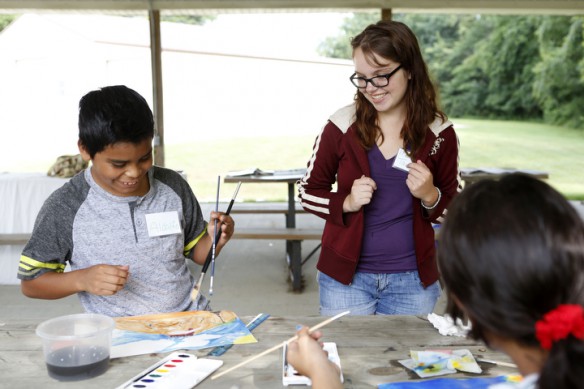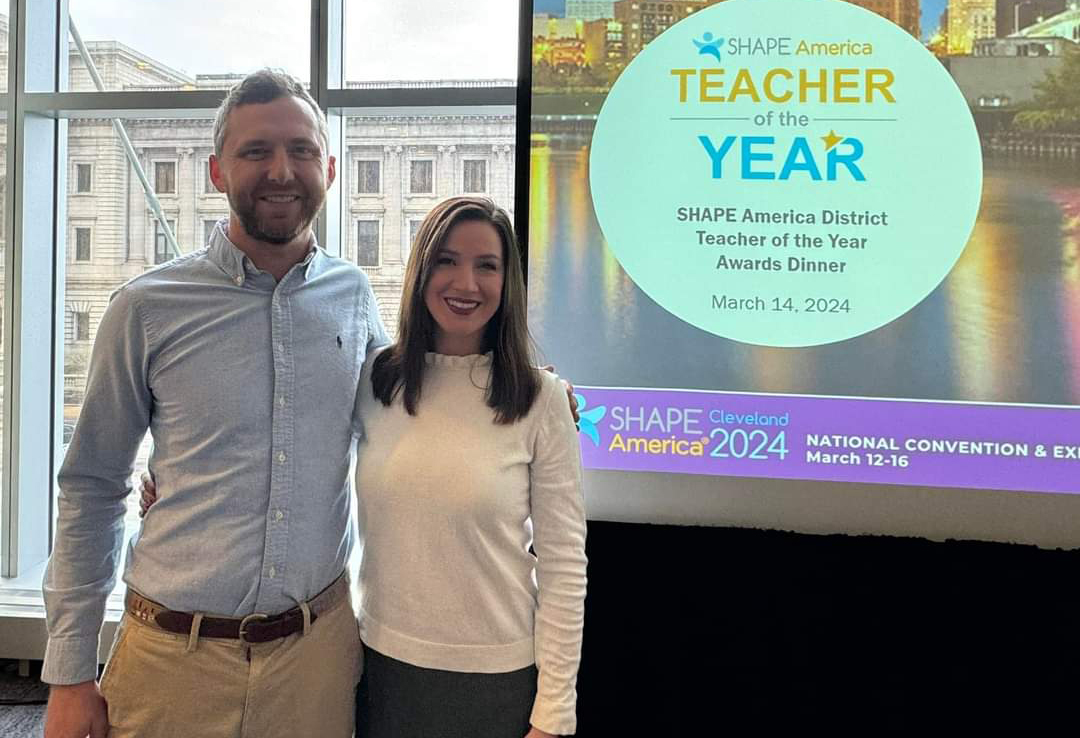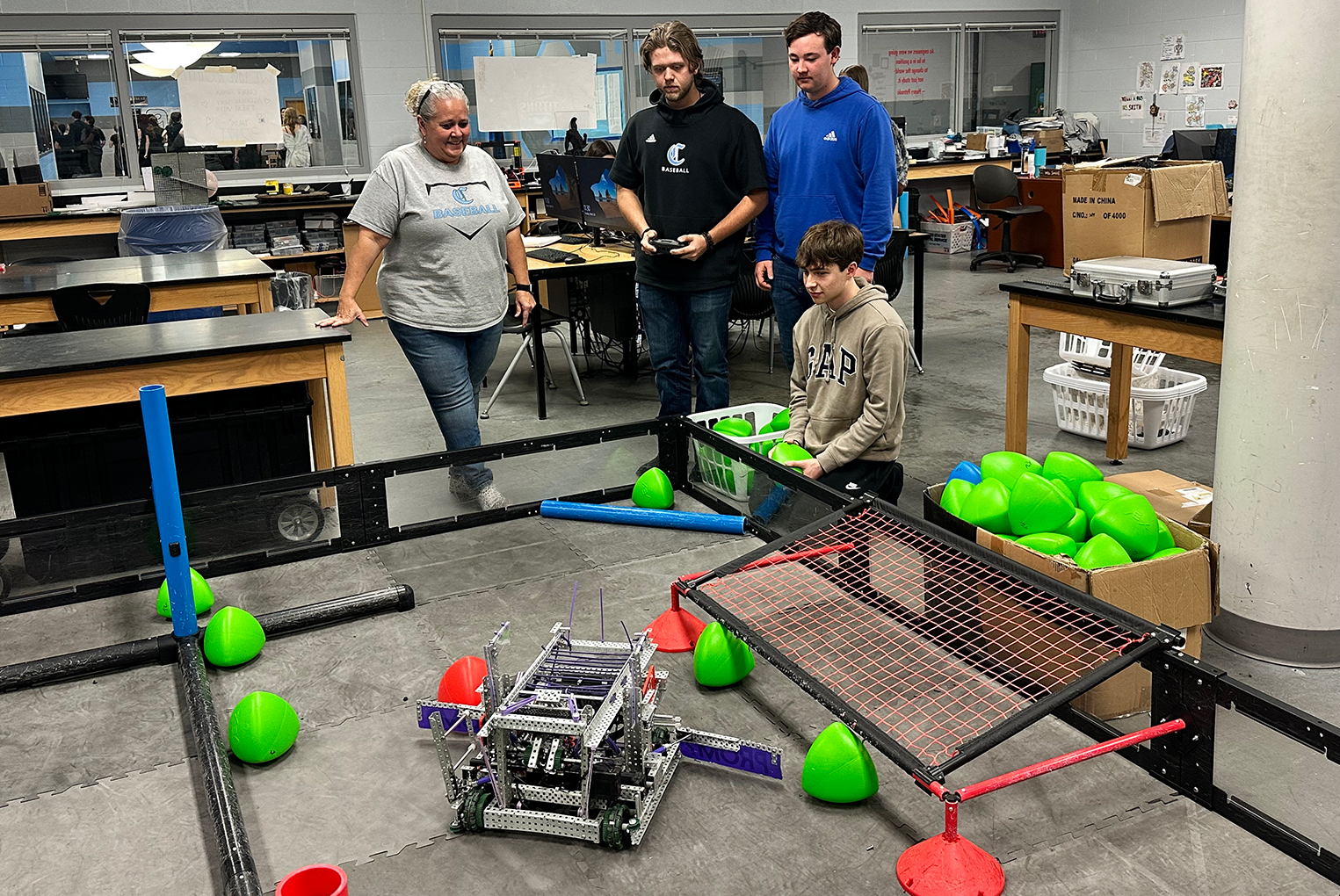
Eastern Kentucky University graduate Tamara Hounshell helps students with their paintings of the ocean during the Go With The Flow migrant writing summer camp. She plans on teaching after earning her Master’s degree in ESL and Spanish.
Photo by Amy Wallot, June 23, 2015
By Mike Marsee
michael.marsee@education.ky.gov
For one week every summer, kids in Madison County’s migrant education program can have the teachers all to themselves.
They are not in a large classroom where they might struggle to keep up with other students, but rather in small groups in which the instruction is focused directly toward them.
On this day, they are working in teams of two or three to construct miniature rafts out of things like Popsicle sticks and pieces of foam, then carefully stacking those rafts with pennies to see how many they can hold before going under water.
It’s one of the many activities and exercises at a science/writing camp that is the centerpiece of the summer program offered by the Madison County schools’ migrant program. The summer schedule includes home visits and outings, but for the past four years this day camp has been a key part of the effort to meet the educational needs of the county’s migrant children.
“We want them to have the best experience they can,” said Rona Comley, the Madison County schools’ migrant advocate and recruiter. “They don’t need to just be doing nothing all summer, and if you’re going to do something, it’s worth doing the best that you can. You may not have these children next week, you may not seem them tomorrow, so the impact that you have is very important.”
That philosophy has driven Comley, a veteran of 32 years in education, to devote her professional life to migrant education. She has spent about 20 years with the migrant program, first as a teacher before moving into her current role.
“She has a heart as big as this room or bigger for the clients that she works with,” said Vivian Bowles, a 4th-grade teacher at Kit Carson Elementary who works with Comley at the science/writing camp. “She has a true love and commitment to the job that she’s doing. It’s not a job, it’s a mission for her.”
About three dozen children were the beneficiaries of Comley’s commitment earlier this summer at the camp. The camp emphasized reading and writing, but there was also a focus on a particular area of science that she said made things more interesting for the students.
“We’ve incorporated the writing and the vocabulary. Children who come from Mexico in middle school don’t have the vocabulary, and they say, ‘I’ve learned things I can use when I go back to school,’” she said.
Bowles, who wrote the curriculum for the five-day camp, said it’s important to connect the reading and writing to something that might capture the children’s attention.
“My philosophy has always been you need to give kids something to read about and something to be interested in,” she said. “Research has shown the correlation between science thinking and English/language arts thinking. If you’re observing, you’re observing. You’re drawing conclusions, you’re summarizing, very similar skills. Also it’s standards-based content, and it helps to expand their vocabulary.”
Bowles made a significant change from past curricula, so the camp’s theme, “Go With the Flow,” had a double meaning.
“The past few years our writing has been informational writing, but this year the teachers had expressed a desire to have kids do more writing on their own,” she said. “We’ve had water-themed science activities, and we’ve focused on free-flow writing, just taking an idea and going with it.”
Children wrote in their journals about the things they saw and did, which included a session with a local author and a field trip to the Salato Wildlife Education Center in Frankfort.
They were guided by a team of teachers and paraprofessionals who get their own rewards from working with the migrant students. Comley works hard to cultivate her network of educators, many of whom return year after year.
“I think she just makes it really fun to teach,” said Gina Stanley, a paraeducator who works with blind and visually impaired students in the district’s special education department and who has worked at the science/writing camp for all of its four years. “She’s very student-focused, she loves kids, and I think everybody here, we all have that in common. She’s giving, just great to work with, and she cares about these families. I think that’s why I come back every year, and I genuinely have a good time.”
The last two camps have been help primarily outdoors, and Stanley said that has helped the students have an even better time.
“One of the dynamics is the kids are doing fun things in camp, and they perceive that to be more fun than just being in a classroom. We take our classroom outside here. It is a classroom, but they don’t realize it. It’s disguised,” she said.
Comley has elementary and preschool teachers, and this year she added a bilingual preschool kindergarten teacher from Mexico who has lived in the United States for four years. The educators are well-trained in advance of the five-day camp, with a half-day training session and several more hours of preparation.
“When they come, they’re prepared. There’s no down time. The teachers interact; they don’t just observe. And they have the same students with them each day. Those are things I feel like have been successful,” she said.
She said the educators relish the chance to work with a small group of students.
“They like it because it’s different. They get to be the teachers they want to be that they don’t get to be in the classroom,” Comley said.
There are about 18 educators in the summer program, and their work doesn’t end when the camp ends. They spend the month of July making home visits to migrant families, traveling in teams of one certified teacher and one paraeducator to visit the 85 or so children in the migrant program in homes, day cares and sometimes even in the fields.
“Rona has people come in and inspire us with a lot of different ideas, and we try to take those tactics into the homes,” Stanley said.
There are other events as well, including another field trip and a family outing to 4-H Day at the Madison County Fair. And the summer culminates with a back-to-school social at which children can stock up on school supplies and their families can have access to community services.
“We register the children for their schools, and there are a lot of welfare needs that we try to incorporate,” Comley said.
Comley said Madison County’s migrant program succeeds in part because of strong support from the state and regional levels, as well as from within the county. She said her goal for the program is not that it be better than those in other districts, only that it be as good as it can be.
“When we go back to our region meetings and state meetings, and you go into a meeting and they say, ‘What did you do this summer?’ and you say, ‘Well, we just sent packets out,’ you’re not going to be looked at very highly. It’s not a competition, but you really want to do well,” she said.
That’s evident in the way Comley equips educators for the science/writing camp. There are duty-free lunch and recess times that allow teachers to talk about what works well or poorly and to plan for the following day, and there are enough educators on hand to
“She appreciates the hours that it takes to be prepared to teach, and she provides enough adults to actually work with these students. For some of these students you need to be working one on one because of the language barrier, but also because of their prior experience in school settings,” Bowles said.
And Stanley said she’s certain the children appreciate the educators’ efforts.
“I guess what stand out most is a lot of these children are very appreciative, and they truly have a good time, and they thank you,” she said. “You feel like you really have made a difference.”
MORE INFO …
Rona Comley roma.comley@madison.kyschools.us
Vivian Bowles vivian.bowles@madison.kyschools.us



Leave A Comment